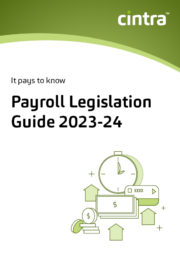Since April 2016 HM Revenue and Customs (HMRC) has offered employers the option to tax employee benefits in kind (BIK) through the payroll. Previously all taxes were paid on benefits by submitting annual P11D forms.
Payrolling BIKs is currently a voluntary scheme.
Payrolling Benefits In Kind:
This means that the cash equivalent of Benefits In Kind which is normally entered onto a P11D form at tax year-end, is divided into equal amounts according to the employee’s pay frequency and is taxed through the payroll. So, for example, if an employee has a BIK cash equivalent of £1,200 and is monthly paid, the BIK of £100 is added to their taxable pay each month.
Payrolled BIKs are shown on the employee’s payslip as a separate item and included in their total taxable pay for the year on form P60.
For starters and leavers, any payrolled BIK is included in their taxable pay to date on a P45 form.
What are the advantages?
There is no doubt that there are clear advantages for the employer as well as employees.
- Employees pay tax on BIKs via the payroll which means that their tax liability on any BIKs is spread over the tax year.
- Employees can clearly see that they are paying tax on the BIKs on their payslip.
- Payrolled BIKs are removed from the employee’s tax code.
- Any BIKs that have been payrolled do not need to be declared on a P11D form or on the employee’s tax return.
- Payrolling is an ideal option for benefits which all employees receive. For example, private health insurance.
- The employer can choose which BIKs to payroll.
- The employer once registered can deselect some employees/directors from payrolling. For example, those with complex benefits such as directors.
- If the employer decides to payroll company cars, then there is no need to complete form P46(Car).
What are the disadvantages?
There are a few things to bear in mind before you decide to start payrolling benefits in kind.
- One important aspect that employees should be made aware of is that the tax due on BIKs which is declared on the P11D is done retrospectively. Employees might find they are paying higher tax due to underpayments in previous years for the first two years of payrolling. However, this will correct itself by the end of the third year.
- Employers should monitor any BIKs that are likely to change during the year and update the payrolled amount accordingly. For example, private health insurance costs may increase during the tax year.
- Although employers do not need to complete a P11D for any BIKs that are being payrolled, there is still a Class 1A liability on certain benefits to be considered, such as company cars and private health insurance. The Class 1A liability should be declared on form P11D(b) and submitted by 6 July following tax year-end as usual.
- Employers are unable to payroll taxable living accommodation or interest free/low interest beneficial loans.
- Once an employer has registered for payrolling he must continue for the whole of the tax year unless the BIKs are no longer provided.
How to Payroll Benefits In Kind?
To join the scheme, an employer must first register with HMRC through the Government Gateway using their ID and password. Once registered, the employer can select the BIKs they want to payroll and deselect any employees and directors they want to exclude from either payrolling or from payrolling certain BIKs.
As mentioned above employers cannot payroll the taxable benefit of living accommodation or the provision of interest free or low interest beneficial loans. These benefits must be declared on a P11D form.
The deadline for registering for payrolling is 5 April 2021 for 2021/22 tax year. However, HMRC would prefer employers to register before Christmas so that these BIKs can be excluded from the employees’ tax codes.
Some employers have been operating an informal arrangement of payrolling BIKs for years. But unless they have registered with HMRC they are still required to report the BIKs on form P11D and mark the forms with the words “Payrolled”.
Employers who have missed the deadline for payrolling may given this option by HMRC as an alternative.
Reporting Payrolled BIKs
All payrolled BIKs must be reported to HMRC on a Full Payment Submission (FPS) through Real Time Information (RTI). This is done automatically through payroll software.
Since April 2017, details of company cars that have been payrolled are also included on the FPS, but you will need this information to hand to enter it initially onto the system. Do not forget to update this information and the calculation of the cash equivalent if the employee changes vehicles.
Tell your employees
Finally, if you decide to opt for payrolling, do not forget to keep your employees informed about the BIKs that will be payrolled and how it will affect their tax each pay day.
Conclusion
In conclusion, there are many advantages to payrolling, it can save time and effort in comparison to completing the P11Ds. Furthermore, the general feedback is that employees prefer this system to taxing benefits in kind via the tax code.
For further details here are some links to official guidance on Gov.uk: Payrolling Benefits In Kind, A – Z of BIK’s
Cintra Payroll Benefits
Our software solution, Cintra Pay, has the functionality to quickly and efficiently manage employees taxable benefits, as well as allowing you to produce P11D forms. We also offer the option of outsourcing P11Ds to our expert team. Click the button below to find out more or contact us to discuss your requirements with one of our team.

EBOOK
Payroll Legislation Guide
The facts, figures, thresholds and allowances for 2023-24 spanning tax, National Insurance, pensions, statutory payments and more.
Download The ABC of Payroll!

